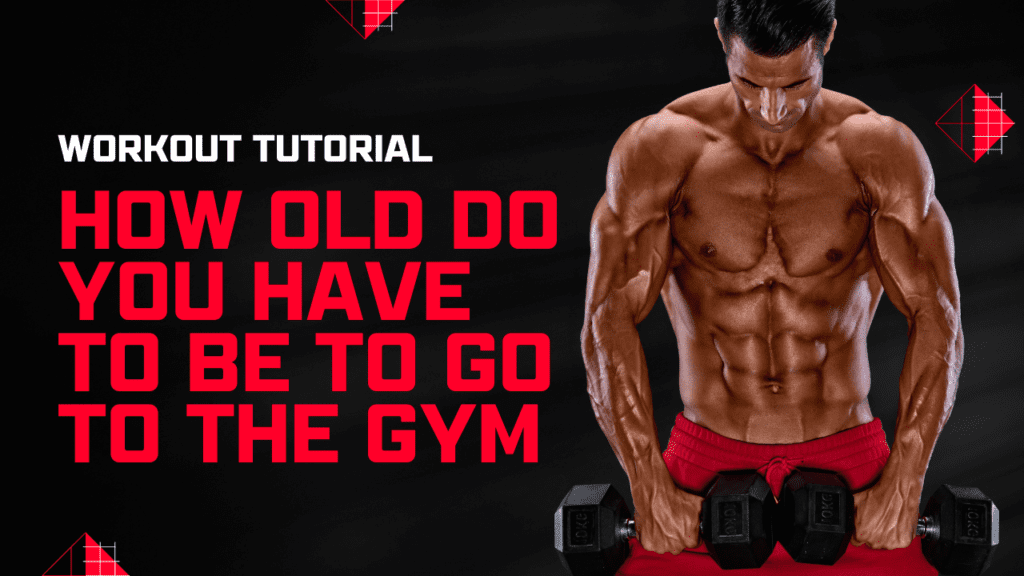Introduction:
If you’re a parent thinking about your child’s fitness or a teenager excited to start working out, you might be wondering, “How old do you have to be to go to the gym?” The answer isn’t always straightforward, as it can depend on several factors, including the gym’s policies, the type of workout, and the individual’s maturity level. In this article, we’ll explore the typical age requirements for gym access, the benefits of starting young, and some important considerations to keep in mind.
Typical Age Requirements for Gym Membership.
Most gyms have age restrictions in place for safety and liability reasons. Typically, the minimum age to join a gym is 13 years old, though this can vary. Some gyms allow children as young as 12 to work out, provided they are supervised by an adult.
For teens aged 13 to 15, many gyms require that they be accompanied by a parent or guardian during workouts. However, once a teenager reaches the age of 16, they are often allowed to use the gym facilities independently, although some gyms may still require a waiver or parental consent.
It’s important to note that specialty gyms and fitness centers, such as those focused on strength training or high-intensity interval training (HIIT), may have stricter age requirements. In contrast, community centers or family-friendly gyms might offer youth programs designed for younger children under 12, promoting fitness in a more age-appropriate and supervised environment.
Why Start Going to the Gym Early?
Introducing fitness early in life has many benefits, both physically and mentally. For teens, hitting the gym can help build healthy habits that last a lifetime. Regular exercise improves cardiovascular health, strengthens muscles and bones, and boosts mental well-being.
In addition to the physical benefits, gym workouts can also promote a sense of discipline, responsibility, and self-confidence. Learning to set and achieve fitness goals can be empowering for young people, teaching them valuable life skills that extend beyond the gym.
What to Consider Before Starting Gym Workouts.
While the benefits of working out are clear, it’s important to approach gym workouts with care, especially for younger teens and pre-teens. Here are some key considerations:
- Physical Maturity:
Not all bodies develop at the same rate. Before starting a gym routine, it’s important to assure that a young person’s body is physically ready for the demands of exercise, particularly strength training. Overloading muscles and joints that are still developing can lead to injuries.
- Supervision and Guidance:
For younger gym-goers, proper supervision is vital. Having a knowledgeable trainer or parent present ensures that exercises are performed correctly, reducing the risk of injury. Many gyms offer introductory sessions or personal training for teens, which can be a great way to learn the basics.
- Focus on Form Over Weight:
It’s important for young people to focus on mastering the correct form and technique rather than lifting heavy weights. Poor form can lead to injury, while proper technique builds a strong foundation for future progress.
- Balanced Fitness Routine:
A well-rounded fitness routine for young gym-goers should include a mix of cardiovascular exercise, strength training, and flexibility exercises. This ensures balanced development and reduces the risk of overuse injuries.
- Nutrition and Recovery:
Proper nutrition and recovery are just as important as the workout itself, especially for teens whose bodies are still growing. Ensuring a balanced diet and complete rest helps in muscle recovery and overall growth.
Alternatives to Gym Workouts for Younger Kids.
For children under 12, traditional gym workouts might not be the best option. Instead, engaging in physical activities that are fun and age-proper can be more beneficial. Sports, dance, swimming, and martial arts are excellent alternatives that promote fitness while also being enjoyable.
Many gyms and community centers offer youth fitness programs designed specifically for children. These programs often include a mix of activities that are tailored to the developmental stage of the participants, ensuring that they stay active in a safe and effective way.
Parental Involvement and Encouragement.
Parents play a important role in promoting a healthy attitude towards fitness in their children. Encouraging regular physical activity, whether through gym workouts or other forms of exercise, sets a positive example.
If your child expresses an interest in going to the gym, take the time to discuss their goals and the importance of starting slow and learning the basics. Consider working out together, as it can be a great way to bond and motivate each other.
Conclusion:
So, how old do you have to be to go to the gym? While the minimum age is often around 13, with some changes depending on the gym, the decision to start working out should be based on the personl’s physical maturity and interest level. For younger children, focusing on fun, age-appropriate activities can be more beneficial than hitting the gym.
Starting a fitness journey early in life has many advantages, from building healthy habits to developing discipline and confidence. With the right guidance, young people can safely enjoy the benefits of working out, laying the foundation for a lifetime of health and wellness.
Before your teen steps into the gym, ensure they are equipped with the right knowledge, supervision, and mindset to make the most out of their workouts. Learn More About The: https://thebeautyfit.com/2024/08/24/what-muscles-does-cycling-work-discover-the-fitness-benefits/

